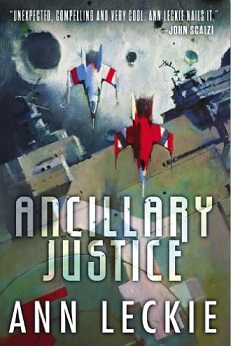
Ancillary Justice
Ann Leckie
385 pages
published in 2013
It’s funny how you don’t notice how ingrained gender is until you get your nose rubbed in it. In Ancillary Justice, Ann Leckie makes it clear by the third page that when her protagonist Breq uses “she” and “her” she uses it as a neutral pronoun, yet unless I paid close attention or Leckie explicitly outed a character as male, I kept thinking of every character she meets as female. That’s I think a response more readers will have, as we’re just not used to thinking of the female form as universal; traditonally it has always been “he” or “him”, or something like singular “they” for those of us aware that the male isn’t actually universal. It may seem like a too clever writing trick, a clumpsy attempt at showing the reader the gender assumptions build into the very language we use, but I don’t think this is actually what Leckie had in mind. What it does instead is establishing the fundamental strangeness of Breq herself even before we learn she’s the last remaining component of a thousands years old warship’s AI.
That consistent use of “she” and “her” foregrounds the difference of the Radchaai culture Breq comes from. It’s a bit of unexplained strangeness that tells a lot about their society, culture and history, most importantly that the Radchaai are inherently matriarchal in the same way most if not all actually existing human societies are patriarchal. But there’s more going on with Breq’s gender blindness, as other Radchaai seem to have far less trouble differiating between men and women, even if they use the same pronouns for both. Meanwhile Breq not only has pronoun troubles, she also has trouble remembering which secondary sexual characteristics are male and which are female. It’s this that singles her out as not quite human.
Read more…
